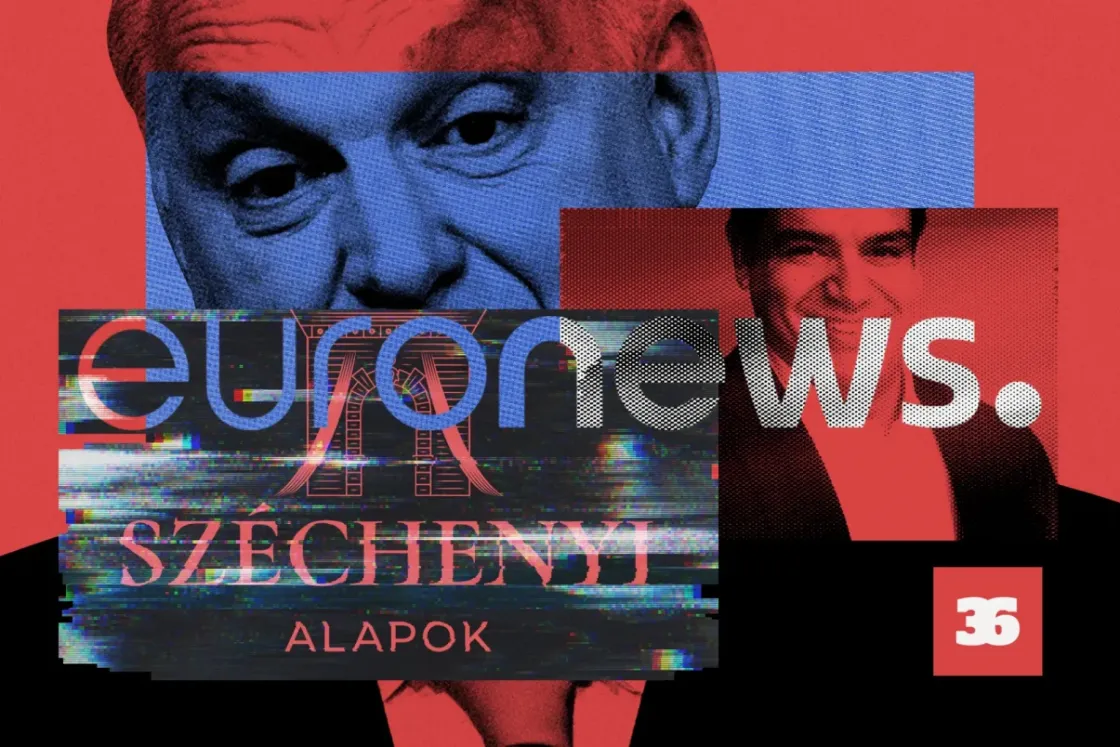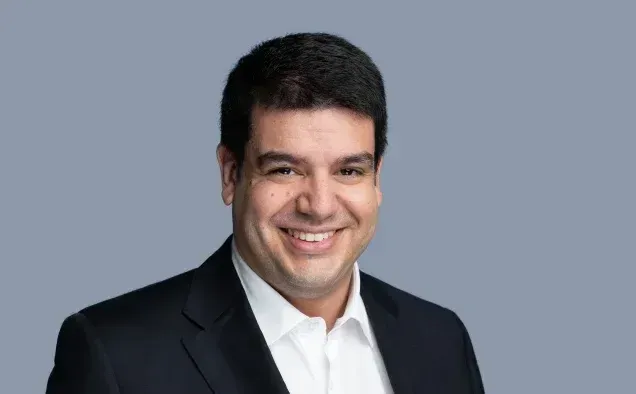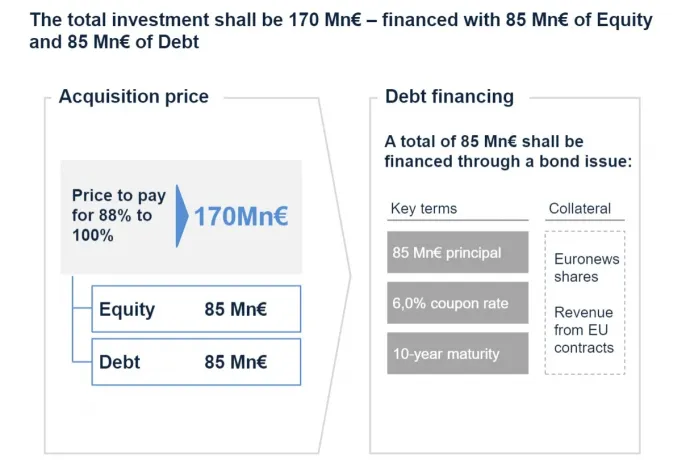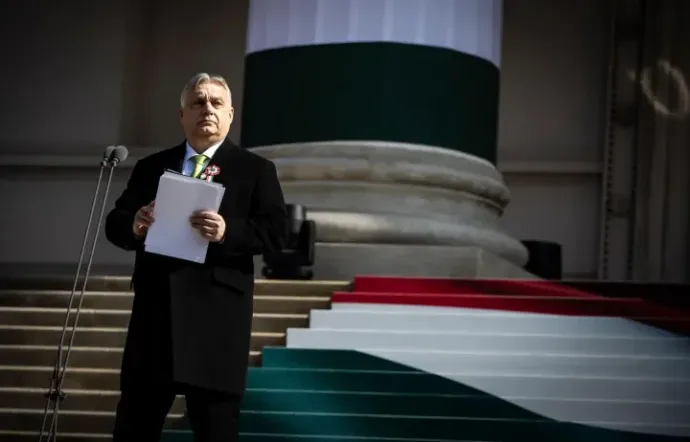Secret documents reveal that Orbán’s people were behind the purchase of one of Europe’s biggest TV channels

Portuguese businessman Pedro Vargas Santos David was greeted with anxious questions when he appeared before the employees of Euronews, one Europe’s biggest television news channels, in early 2022.
Shortly before, at the end of 2021, it was announced that David’s company was to buy the channel, which they claimed had 145 million viewers a month. The news alarmed organizations and people concerned about press freedom in Europe, both inside and outside television. The reason for the concern was that David was known to have close personal and business ties to Viktor Orbán’s government, which over the past few years has significantly curtailed independent journalism in Hungary, while building up a huge propaganda machine.
David tried to allay fears about this connection in Euronews’ newsroom. According to a source familiar with the details of the meeting in early 2022, the then 37-year-old businessman spoke in a friendly manner, smiling and said it was purely a business investment for him. He added that he was not the same as his father, Mario David, a conservative Portuguese politician who is on friendly terms with Orbán.
However, what David did not tell Euronews staff was who had provided the funds for the deal. His company told the Portuguese newspaper Expresso in 2021 that there was no public money in the deal and that there were no Hungarian businessmen among the investors.
Viktor Orbán also tried to dismiss any speculation that he or his party, Fidesz was involved in the deal. When asked at a press conference in December 2021 whether Fidesz circles might be involved in the acquisition of the international TV channel, he said that
“Fidesz does not have any plans for a world empire, I can say that for sure, and I cannot speak for business companies”.
However, Hungarian government circles did in fact have a very serious role in the takeover. An investigation by Direkt36, together with Expresso and the French newspaper Le Monde, revealed that a significant part of the €150 million deal was financed by Hungarian state and government-related actors.
Documents obtained by Direkt36 show that €45 million was provided by a Hungarian state capital fund. This was a company called Széchenyi Funds (SZTA), formerly controlled by the Ministry of Finance and later handed over to a university foundation. The money was placed in an investment fund called the European Future Media Investment Fund, which eventually acquired Euronews.
Our investigation also revealed that the transaction involved a company that is a major player in the Hungarian government’s propaganda campaigns. Company documents show that an investor in the European Future Media Investment Fund received a long-term loan of €12.5 million from a Hungarian company called New Land Media. This company is owned by Gyula Balásy, whose companies have received contracts worth hundreds of billions of forints in government communication campaigns over the last ten years, according to a recent analysis by Hungarian news site G7. These campaigns are overseen by one of Orbán’s closest confidants, Antal Rogán, the head of the Prime Minister’s Cabinet Office.
Although sources familiar with the inner workings of Euronews say there is no indication that the new owners are interfering in editorial decisions, leaked documents suggest that the acquisition of the channel was also motivated by political goals. For example, one of the preparatory documents prepared by SZTA staff stated that the objectives of the acquisition included “mitigating left-wing ideology and bias/one-sidedness” in cooperation with universities.
Orbán’s press chief told Direkt36 that they knew nothing about the deal. Euronews CEO Guillaume Dubois told Le Monde that he was not aware of the Hungarian state’s role in the deal but added that he did not need to know the investors anyway. Dubois also said that the newsroom was under no pressure from anyone to change their reporting on Hungary.
SZTA did not respond to our detailed questions on the Euronews investment. Their general response they said that “investment decisions are always preceded by a careful and detailed analysis.” They added that they would not comment on specific transactions due to confidentiality rules. Balásy also did not provide a substantive answer to specific questions, other than to say that the “long-term loan is one of the investments that as a businessman I have considered to be useful and profitable.”
Pedro Vargas Santos David and his company Alpac Capital did not respond to our questions.
The decision
On the morning of 10 February 2022, more than a dozen people gathered at the headquarters of Széchenyi Funds management company (SZTA), in its office near Blaha Lujza Square in Budapest.
Until a few days earlier, this company had been directly under the supervision of the Ministry of Finance, but in February 2022, the government decided to transfer it to the Rudolf Kalman Foundation for the University of Óbuda, which maintains Óbuda University. Technically, the SZTA stopped being under government control, but the link remained. The chairman of the foundation’s board of trustees was Mihály Varga, the Minister of Finance, and SZTA continued to manage investment funds in which the Hungarian state had largely invested the money. (The staff of Varga, who has left the foundation board since then, told Direkt36 that he had no decision-making power in relation to capital funds.)
One such fund, the Economic Development Private Equity Fund, set up with taxpayer money, was discussed on 10 February. In addition to some SZTA staff, four board members of the management company were also present, as well as members of the investment committee of the Economic Development Private Equity Fund, including former Fidesz MP Ferenc Papcsák.
These two bodies were responsible for deciding which investments should be made from the publicly funded fund. On the agenda for the February 10 meeting was a major foreign deal: a €45 million investment in the European Future Media Investment Fund (EFMIF).
According to documents obtained by Direkt36, the majority of participants in the meeting, which lasted almost an hour and a half, decided to support this decision. First the investment committee, which Papcsák presided over at the meeting, decided that “the proposed transaction fits in with the investment strategy of the Economic Development Private Equity Fund”, and then the board of the SZTA also passed a resolution supporting the transaction.
Before the decision, the two boards received a 64-page presentation, marked ‘strictly confidential’, which set out the details of the investment. The document, drawn up by SZTA staff, states that EFMIF is managed by Alpac Capital, led by Pedro Vargas Santos David and his partner, and that the €45 million in funding from the Hungarian state through SZTA will be used to buy Euronews, “one of the world’s 4 leading news channels.”

The leaked documents do not say exactly who initiated this investment, but according to a source familiar with the details of the deal, it was clear that the order for making this investment had come from the top.
“This was a good example of a decision being pushed through manually,” said the source,
who added that those who had arranged the investment were specifically told not to reveal anything to the public. The leaked presentation reveals that Alpac planned to spend a total of €170 million on the acquisition. Of this, 150 million was the purchase price and the remaining 20 million was intended to finance Euronews and cover its planned restructuring. According to the leaked documents, the Hungarian state funding played a key role in this. Half of the amount was equity; the rest was to be raised through loans. In other words, more than half of the €85 million equity was provided by the €45 million raised through SZTA.

SZTA put in this money without having any idea of the other investors involved in the project, according to the leaked documents. “The co-investor is said to be a member of the Alpac group, but its exact identity is not known,” one of the preparatory documents stated. It was also written that there was only “verbal information” that unnamed “business circles” were ready to provide the funds.
The head of a Hungarian venture capital fund told Direkt36 that it is not usual for someone to enter a deal without knowing who their co-investors are. “It’s very unusual that this didn’t give them a pause,” the investor explained, saying that in this case a normal investor would pull back from the deal. The source, who asked for anonymity due to the sensitivity of the topic, added, however, that the solution used by SZTA was apparently designed to hide the identity of those who were financing the deal.
“It is a scheme designed to hide the owner, not to make the business procedures easy,” the investor said.
But it turns out that deep in Hungarian public company records there are clues as to what other players were involved in the deal. These links also lead close to the Hungarian government.
The Alpac group, led by Pedro Vargas Santos David, has a Hungarian-registered member, Alpac Media Investments Kft. The company’s 2022 annual report states that the company has more than €28 million worth of investment units in the EFMIF. The report also shows that the company received help from a member of the group of companies owned by Gyula Balásy, who has been a key player in the Hungarian government’s propaganda campaigns for years. In fact, the company papers state that Alpac Media Investments Kft. received a long-term loan of €12.5 million from New Land Media Kft., a company owned by Gyula Balásy. According to the document, this was through a bond transaction maturing in 2033.
The vision
According to the leaked documents, investors had ambitious plans with the acquisition of Euronews.
The leaked presentation stated that the “vision” was to “create the most influential and insightful media in the EU, with a mission on enforcing the accountability of the Brussels bubble”. Even more far-reaching ambition is demonstrated by the objective to “support the diversification of European journalism and global events”. At this point, it is noted that they want to „establish partnerships with top EU universities to mitigate left bias”
According to a source with close knowledge of the deal, those behind the scenes who managed the state-funded part of the investment made no secret of the political importance. According to the source, the people who worked on the investment were told that Euronews was needed because Hungary was facing too much criticism abroad and they wanted to improve the country’s image.
“They said we needed to have a European platform where we could present ourselves in a better light,” the source said.
Guillaume Dubois, CEO of Euronews, told Le Monde that he was surprised to hear these ideas. “We have prepared a strategic plan that has nothing to do with this,” explained Dubois, who said the plan was about strengthening their presence in Brussels and other European capitals. The CEO also stressed that there was no influence from the Hungarian government.
“I have never had any personal or professional contact with officials in Hungary,” he added.
Other sources familiar with the workings of Euronews also told Direkt36 and Le Monde that they had not yet seen any sign of any pressure on the channel to portray the Hungarian government in a more positive light. “Even if there is an ambition to change the direction of Euronews, it would be very difficult to do so,” explained one source, who said that “it would be a scandal if there was a change of direction, the channel would lose credibility, advertisers would leave and it would have to be financed out of pocket.”

People at SZTA were also aware of the business risks of the political repositioning of the channel.
For the board and the investment committee meeting of 10 February 2022, the risk management experts of SZTA prepared a position paper in which they pointed out that “the news channel cannot operate profitably on private sector revenues,” and also that 44% of the revenues „comes from EU contracts.” The risk managers questioned “whether the EU institutions would continue to be willing to finance program production in the event of a change in the channel’s orientation (e.g. the emergence of EU-critical opinions)”.
The resolution therefore considered the political risk to be “high” and said that this can only be mitigated “if additional contracts are secured or can be replaced.”
Euronews currently receives EU funding under a multi-year agreement, with €18.8 million in 2022 and €12.2 million last year. The European Commission told Le Monde that this expires in July this year and will not be extended. Instead, a new public tender will be launched, in which Euronews will be able to participate if it meets the conditions.
Facing problems
Not even a year after the decision about the investment, SZTA concluded that the €45 million of Hungarian taxpayers’ money was not in the best place after all. A presentation to the board of directors in January 2023 raised several serious concerns about the investment and suggested that they exit the investment.
According to the leaked material, there was dissatisfaction in SZTA with Alpac’s managing of the EFMIF fund, headed by Pedro Vargas Santos David. SZTA complained, among other things, that Alpac had taken steps without adequate justification which had led to delays in the administration of the project. For example, they found it problematic that some deadlines had not been met and that, as a result, certain conditions of the investment had to be renegotiated.
Among the documents obtained by Direkt36 is a correspondence in which a Hungarian law firm with links to SZTA pursued Pedro Vargas David for months in an attempt to get him to pay his allegedly overdue bills. According to the correspondence, at one point David sent a curt reply, saying “I confirm that I will pay this invoice,” but then apparently this did not happen, because the law firm continued to send emails urging payment of the invoice months later.
In addition to these disruptions, SZTA has also raised much more serious concerns. The preparatory material for the January 2023 board meeting stressed that Euronews was “performing worse than expected due to changed market conditions (EU economic slowdown, rising inflation, rising interest rates, rising wage costs, etc.)”, and that the implementation of the company’s so-called “turnaround strategy” to increase efficiency had been delayed.
“The company will therefore require additional external financing this year, the amount and source of which is uncertain at this stage,’ the preparatory document states.
They added that “another significant risk for Euronews’ operations is the possible reduction/loss of EU funding”.
The submission, signed by the investment director of SZTA, directly proposed to the Board of Directors to withdraw from Euronews. The document reveals that the co-investor in the EFMIF, Alpac Media Investment, also owned by Pedro Vargas Santos David and his business partner Luis Santos, was ready to buy out the public fund managed by SZTA from the EFMIF. The offer was that Alpac Media would buy out the SZTA fund at issue value, i.e. for €45 million. This would have meant that the fund, financed by Hungarian taxpayers’ money, would have realized no yields on nearly a year’s investment.
However, the leaked documents do not indicate whether the buyout was eventually completed. From the publicly available information, it appears that the Hungarian state fund investing in EFMIF was transferred from SZTA to other state-related fund managers Hiventures and then Focus Ventures. We contacted both fund managers, and Hiventures responded, but did not disclose what happened to the Euronews investment during their management period. They said that details of their investments were “strictly business secrets.”
EFMIF, registered in Portugal, was liquidated in 2023, but what happened to the fund’s assets it is not clear from the Portuguese company information files. The current ultimate owner of Euronews is a Dubai-registered company belonging to the Alpac group.
Orbán’s projects
It is not the first time that roughly the same actors have secretly financed politically sensitive investments.
Direkt36 reported last autumn that SZTA also provided more than HUF 70 billion to 4iG, a telecommunications company supported by the Orbán government in various other ways and personally prioritized by the prime minister. The method at the time was that one of the state funds managed by SZTA merged with a private fund, which then used most of this money to raise capital in 4iG. According to the leaked documents, this capital injection was specifically needed to finance the expansion of the company. In other words, an officially private company secretly received tens of billions of forints of taxpayers’ money to expand its empire.
In that article, we also mentioned the involvement of Pedro Vargas Santos David, who is currently a member of 4iG’s board of directors.
Even before the Euronews investment, there were attempts by government circles to expand into foreign media markets. As Direkt36 and other newspapers have previously reported, pro-government actors have invested significant sums in the media markets of Balkan countries, with the apparent aim of helping local allies of the Orbán government there.
In addition to the Euronews investment, David and his business partner bought a Portuguese weekly newspaper, “Nascer do Sol”, and a daily newspaper, “I”. According to Expresso’s research, these two newspapers are owned by the same Dubai-registered company, Alpac Capital, as Euronews.
The investment in Euronews, an international television news channel present in many countries, is in a different league. Although there is no information showing that Orbán was directly involved in the deal, the Hungarian prime minister’s ambitious political plans would in principle fit in with a media outlet with European reach. In his speech on 15 March this year, Orbán declared that “we have no choice but to occupy Brussels.” We asked the prime minister’s press chief if the Euronews investment had anything to do with this ambition, but he brushed aside all questions about the deal, saying “we don’t know anything about it”.
We used the Hungarian company registration data base Opten for this investigation.
This article is part of a partnership between Telex and Hungarian investigative journalism center Direkt36.